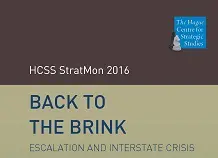High-stakes crises between states are dotting the world map. The annexation of Crimea locked Russia and the West into a standoff, while recent months witnessed flaring tensions between Turkey and Russia as well as between Saudi Arabia and Iran. Rather than isolated incidents, these events mark a larger trend: the comeback of interstate crisis. For decision makers, who have largely shifted attention to the unconventional threats of terrorists and failed states, now is the time to return to the lessons of crisis management of the past. It is time to reacquire crisis literacy.
Watch the introductory video below.
The quintessential characteristic of crisis is escalation, the spiral of aggressive moves and countermoves that states adopt in response to a perceived threat. Crises need not be violent, but the interactive, multidimensional, and self-reinforcing elements of escalation make the course of a crisis hard to predict. This is all the more true now that contemporary crises move beyond military hostilities and escalate by spreading out over the map, stretching out over time, and venturing into other domains. The essence of crisis management lies not in the avoidance of crisis altogether, but in the careful balance of preventing war and protecting one’s core values and interests.
Drawing on theoretical crisis scholarship and the empirical record, this report offers nine insights for defense and security organizations to prepare for future crises. Decision makers should not rely on ad hoc measures, but invest in crisis informatics before violence erupts; respond to the complexities of crisis with hybrid escalation dominance and different deterrent strategies; distinguish what interests are vital; avoid rash chicken games but know when not to shy away; gain a much deeper understanding of motivations and constraints of the adversary; and engage allies and adversaries to tackle crisis stability head on.
The report can be downloaded here.
Introductory video:





